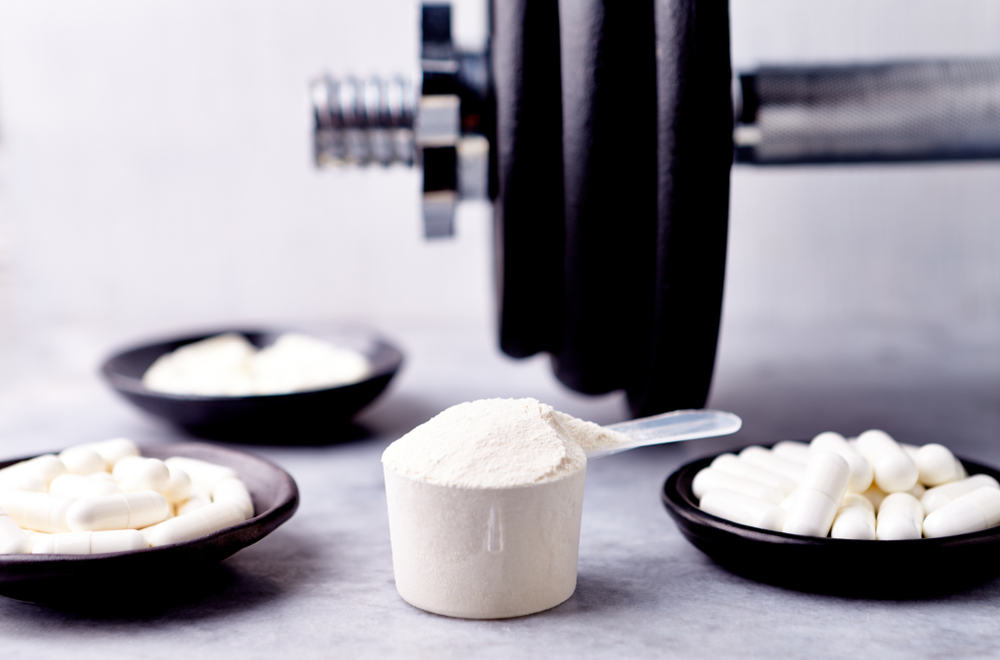Pre-workouts are part of the family of dietary supplements. The prefix "Pre" means "before" and "workout" means "training. As the name suggests, these products are used before training. There are more and more of these dietary supplements on the market, boasting increasingly crazy effects. But what are they really for? Do they all have a real purpose?
Strength boosters
Creatine
Numerous studies have shown that creatine supplementation increases strength and muscle volume when coupled with a specific training session (resistance work).
This is due in particular to its action on energy metabolism, as it intervenes in the alactic anaerobic pathway, and therefore makes it possible to gain explosiveness.
It has also been shown that creatine intake reduces the glycaemic response after a high carbohydrate diet. This is achieved by increasing the number of glucose transporters on the surface of the muscle cells which allows for a better ability to utilise blood glucose.
Although this can lead to increased muscular endurance, taking creatine before training can lead to reactive hypoglycaemia due to its ability to lower blood glucose.
It is therefore recommended to use creatine at mealtimes, at a daily dose of 2-5g of creatine to maintain muscle creatine levels.
Beta alanine
This amino acid is able to reduce the feeling of fatigue while increasing muscular endurance and strength. In the body, beta alanine increases the concentration of L-carnosine in the muscles. Carnosine regulates the acid-base balance in the muscle fibres.
During intense exercise, lactic acid rich in hydrogen ions is produced and leads to muscle fatigue and reduced strength. Taking this amino acid before a training session helps to achieve better training performance by delaying the onset of fatigue and therefore allows for better progress.
The tingling sensation your pre-workout supplement will give you on the skin is a reliable indicator of the presence of beta alanine in the product.
Betaine
This amino acid derivative is one of the substances commonly used in performance enhancing dietary supplements. Numerous studies have demonstrated the ability of betaine to increase strength but also anabolism via an increase in markers of muscle protein synthesis.
Focus boosters
Caffeine
Most pre workouts on the market highlight their ability to increase the heart rate thanks to a molecule present in almost all homes: caffeine.
This active substance in coffee has many properties. In particular, it increases energy levels. Caffeine has the ability to improve concentration and provide a boost of energy thanks to its ability to increase the secretion of adrenaline.
This hormone, produced mainly by the central nervous system, increases heart rate, stimulates concentration and reduces feelings of fatigue. Its ability to increase metabolism may also make it a valuable aid in weight loss.
The European Food Safety Authority (EFSA) has established that a dose of 200 mg of caffeine (2 to 3 espressos) per day does not present a health risk when consumed within 2 hours before a workout. However, over-consumption before a training session at the end of the day can cause insomnia.
Pre-workout supplements with doses of up to 500mg of caffeine should be used in moderation as they can cause serious heart and sleep disturbances.
Tyrosine
This amino acid, naturally produced by the body, has been shown to have a significant ability to stimulate cognitive function. Indeed, tyrosine is a precursor of many hormones involved in concentration such as dopamine and adrenaline. Two hormones involved in energy metabolism.
Although there is no evidence of a possible beneficial action on physical capacities, its ability to stimulate cognitive functions and alertness is well known in short-term stressful situations.
Combined with other active ingredients, tyrosine has very beneficial effects on the quality of training.
Taurine
This amino acid plays the role of a neurotransmitter. It is found in large quantities in the brain, muscles and retina. Contrary to what one might think, taurine is not an exciter, but it is used in food supplements and energy drinks to optimise their effects.
Pre-workouts are loaded with exciting molecules, which cause a rapid and very strong effect, followed by a sharp drop in energy levels within an hour. Taurine potentiates this effect by reducing the tremors and mood swings caused by the pre-workout. It makes the effects of stimulants more pleasant and therefore allows you to be more efficient and productive during training.
Vasodilators
Arginine
As a precursor to nitric oxide, arginine acts as a vasodilator and therefore improves muscle congestion. When nitric oxide is released, it widens the blood vessels by relaxing the muscles in their walls. This reduces blood pressure and increases blood flow to the muscles worked during the workout.
The muscles are flooded with blood, which supplies them with the nutrients and oxygen they need to function properly. The blood flow also removes metabolic waste products such as lactic acid, which reduces muscle damage, promotes recovery and contributes to optimal performance. However, its effectiveness via oral supplementation remains highly debated.
Citrulline
This amino acid, often used in the form of citrulline malate in pre-workouts, is a precursor of arginine. This means that it is an additional way to increase plasma levels of arginine and therefore nitric oxide.
Numerous studies have shown that citrulline malate supplementation improves the performance of subjects suffering from asthenia. Blood lactate and ammonia levels were significantly reduced after endurance exercise. This contributes to a better recovery after physical effort.
Our advice
In conclusion, there are a multitude of different pre workouts ranging from standard pre workouts to anabolic pre workouts. Finding the most suitable one for our desires is not always easy. Depending on whether the aim is to boost energy, have an anabolic effect, help with muscle congestion or stimulate cognitive function, it is necessary to refer to the few components listed above.
It is preferable to use these products occasionally in order to limit the phenomenon of addiction which leads to increasing the doses to obtain the desired result. It is also recommended to use products that comply with French regulations, which must respect the maximum authorised doses to guarantee the safety of consumers.
Bibliography
1 Volek JS, Rawson ES. Scientific basis and practical aspects of creatine supplementation for athletes. Nutrition. 2004 Jul-Aug;20(7-8):609-14
2 Gualano B, de Salles Painneli V, Roschel H, Artioli GG, Junior MN, Lúcia de Sá Pinto A, Rossi da Silva ME, Cunha MR, Otaduy MC, da Costa Leite C, Ferreira JC, Pereira RM, Brum PC, Bonfá E, Lancha AH Junior. Creatine in Type 2 Diabetes: A Randomized, Double-Blind, Placebo-Controlled Trial. Med Sci Sports Exerc. 2010 Sep 24.
3 Giannini Artioli G, Gualano B, Smith A, Stout J, Herbert Lancha A Junior. The Role of beta-alanine Supplementation on Muscle Carnosine and Exercise Performance. Med Sci Sports Exerc. 42:1162-1173, 2010.
4 Maresh, CM, et al. The effects of betaine supplementation on strength and power performance. Medicine & Science in Sports & Exercise 39(5 suppl. ): S304, 2007.
5 Cholewa JM, Wyszczelska-Rokiel M, Glowacki R, et al. Effects of betaine on body composition, performance, and homocysteine thiolactone. J Int Soc Sports Nutr. 2013;10(1):39. Published 2013 Aug 22. doi:10. 1186/1550-2783-10-39
6; Nehlig A. (2010) Is caffeine a cognitive enhancer? J. Alzheimer's Dis. 20, S85-9410. 3233/JAD-2010-091315
7. http://www. efsa. europa. eu/sites/default/files/corporate_publications/files/efsaexplainscaffeine150527fr. pdf
8. Schaffer, S. W. , Shimada, K. , Jong, C. J. et al. Amino Acids (2014) 46: 1147. https://doi. org/10. 1007/s00726-014-1708-
1
9. Bode-Böger SM, Böger RH, Galland A, Tsikas D, Frölich JC. L-arginine-induced vasodilation in healthy humans: pharmacokinetic-pharmacodynamic relationship. Br J Clin Pharmacol. 1998;46(5):489–497.
10. Bendahan D, Mattei JP, Ghattas B, et alCitrulline/malate promotes aerobic energy production in human exercising muscle British Journal of Sports Medicine 2002;36:282-289.





